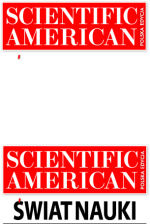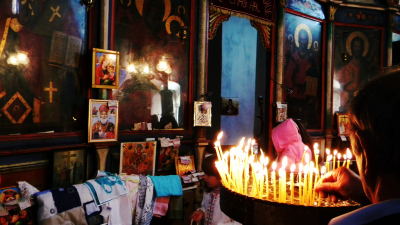 2006
2006
 2008
2008
 2010
2010
 2012
2012
 2014
2014



 |
Not only Easter eggs – Easter in Macedonia
‘Easter in Poreche (Republic of Macedonia) – syncretic forms of rituals and beliefs in the Balkans’
Jagiellonian University, Institute of Ethnology and Cultural Anthropology Easter in Makedonski Brod Church 2011 |

|
Description popularizing the research project
A table set for the Easter celebration, even if filled with traditional dishes, seems to be missing something important without Easter eggs. They are everywhere: on holiday cards, napkins, tablecloths, shop windows and TV commercials. No wonder, as an egg is a universal symbol of life awakening after a long slumber, it reflects the concept of resurrection perfectly. Although the roots of the belief are pagan it was smoothly adopted by Christianity. Orthodox Christians also decorate their households and even graves of their relatives with Easter eggs. Like Catholics, Orthodox Christians have their food blessed; they share the food with their relatives, during Easter Triduum they worship Holy Sepulchre. Yet the details of Easter traditions often differ even between next-door neighbours. Among the symbols and customs universal for many cultures, there are also local ones, characteristic and unique for a particular area, although still celebrating the same religious event. It is so in the Balkans where whole chapters of history have been written with peoples invading other peoples; whole nations migrating, escaping, banished and returning to their homes after long years of wandering. The mixture of cultures, religions and history of given communities affected the traditions, especially the most special ones – religious festivals. Very often, the Easter traditions contain seemingly mutually excluding elements that, in extreme cases, may lead to religious conflicts. In one of the Macedonian towns the domes of Orthodox churches, among the flickering prayer candles, hide rites where pre-Christian, Muslim and Orthodox beliefs are interwoven into one. In today’s global world, it is easy to borrow both holidays and their celebrations. Yet customs resulting from centuries-long coexistence of Muslim Turks and Orthodox Slavs in Poreč, Macedonia, are something more than just mutual borrowings. It is the Tradition for which an Easter egg is just a colourful addition.
Abstract
The main purpose of the "Easter in Poreche (Republic of Macedonia) - syncretic forms of rituals and beliefs on the Balkans" was the study of rites of Easter, which is part of the annual cycle in the town of Makedonski Brod in the region of Poreche. The study was conducted in 2010 and 2011. The focus was on examining syncretic forms of religion among people of Poreche – pre-Christian substrate, elements of the Orthodox Church and Islamic influences. This was the first such a study conducted in this town by a Polish ethnologist and one of very few at all. The author also wanted to check the process of change that occurred in the socio-cultural field of the area over the past 80 years. Its aim was to compare the results with the achievements of Polish anthropologist Joseph Obrębski, who in 1932-33 was stationed in one of Poreche villages (Volcze) and conducted research in the field of social and cultural anthropology. During the test ethnographic and anthropological methods were used, including participant observation and interviews. Application of these methods was preceded by library queries both in Poland and Macedonia. As a result of the completed project the author provided information on everyday and religious life of a small community of central-western Macedonia in the early twenty-first century. The residents of Makedonski Brod are Orthodox in their beliefs, however, pre-Christian element remained well preserved; influences of the Muslim religion have also been noticed, which resulted from long-established Ottoman presence in the area. Audiovisual data collected allowed the author to create an ethnographic film "Vtor Veligden den", while other data are being prepared and will be used in the emerging scientific publication.
Patronat honorowy
Leszek Jodliński
Dyrektor Muzeum Śląskiego w Katowicach
Zygmunt Łukaszczyk
Wojewoda Śląski
Jan Malicki
Biblioteka Śląska
Piotr Uszok
Prezydent Katowic
Adam Matusiewicz
Marszałek Województwa Śląskiego














